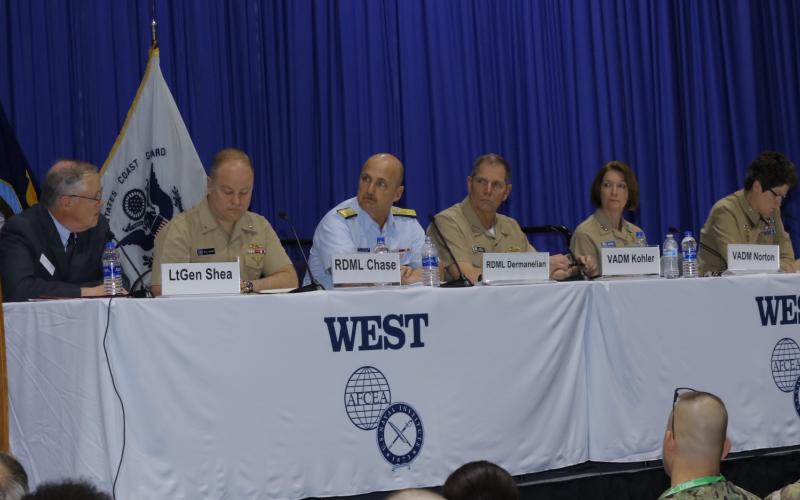The United States is fully engaged in combat operations in the cyber realm, according to a panel of military officials at the AFCEA-USNI West conference in San Diego.
Lt. Gen. Robert Shea, USMC (Ret.), president and CEO of AFCEA International, who served as moderator on the panel, kicked off the discussion saying the nation is in “Phase III” in the information domain. Phase III refers to the multiple stages of war. According to GlobalSecurity.org, the phases include: halting an invasion, force buildup and deployment, counteroffensive or counterattack, and ensuring postwar stability.
“Information has really become recognized as one of the key warfighting enablers. In some cases it can be the main effort. We are in phase III right now. The bottom line is we’re in a contested environment when it comes to information,” Gen. Shea said. “Information has really become a key piece of the global war fight.”
Rear Adm. William Chase III, USN, deputy director for command, control, communications and computers/cyber, J-6, Joint Staff, echoed that sentiment. “Within the information domain for the joint force competition already exists. We have forces in contact every day,” Adm. Chase said.
And the cyber fight involves more than just the military. “That competition exists in the homeland, the defense industrial base, critical infrastructure. Social media has widely been demonstrated to influence public opinion, sometimes using false or alternative facts, and then bot armies are used to like and corroborate those stories and to generate overall fake opinions and sway the opinions of others,” Adm. Chase pointed out.
Furthermore, the kinds of attacks in the cyber realm are varied. “We’ve seen cyber used to perform sabotage, espionage and industrial theft,” Adm. Chase added.
Vice Adm. Matthew Kohler, USN, deputy chief of Naval operations for information warfare and director of Naval intelligence, also voiced agreement. “We consider ourselves, from the information warfare perspective, to be in contact every day,” Adm. Kohler stated.
Vice Adm. Nancy Norton, USN, director of the Defense Information Systems Agency and commander for the Joint Forces Headquarters-Department of Defense Information Network, reported that her agency faces 1.5 cyber events each day. “I will reaffirm that we are in phase III in the cyber domain today,” she said. “There’s no question about that in my mind. We very definitely are in contact with adversaries, not always knowing who that adversary is in the cyber domain.”
Adm. Norton described the phase III operations as “hand-to-hand combat contact with the adversaries in the cyber domain every single day.”
Lt. Gen. Loretta Reynolds, USMC, deputy commandant of information for the Marine Corps, explained that the information domain is important because information influences how rapidly and effectively warfighters and commanders make decisions. “Shortening our ability to make good decisions but lengthening our adversaries’ decision-making capability is really what we’re trying to do in the information fight,” she noted.
And that information fight already is underway. “In the information fight, the war has already begun. Adm. Norton and her team are defending aggressively every day—as are all of us who run networks. Data is the currency of the next fight. Whether it’s data for fires, data for logistics, or data for command and control, it doesn’t matter. It’s all about data,” Gen. Reynolds stated.
Adm. Chase reported that the Joint Chiefs of Staff are taking measures to improve cybersecurity. “The Joint Staff have met several times in the last nine months to work on interoperability and to look at cyber around everything from election security to the critical infrastructure. Financial, energy and commerce are the first three [critical infrastructure domains] that are being looked at,” he said.
One of the goals, Adm. Chase added, is to determine what role the military can play in the event of a major evolution and what could DOD bring to bear that would be useful and timely.
The panelists touted the need for a whole-of-government cooperation in the information domain. Rear Adm. David Dermanelian, USCG, assistant commandant, Command, Control, Communications, Computers and Information Technology, and commander, U.S. Coast Guard Cyber Command, noted that multiple departments and agencies, including state and local governments, worked together to ensure “safe and secure” mid-term elections. “We need that unity of effort,” he said.
Gen. Shea concluded the panel discussion by encouraging the audience to research the Jack Voltaic multisector cybersecurity exercise. “The fact that it is openly acknowledged by senior leaders in the government that we are now in phase III of operations ought to alert everybody and ought to have you on the edge of your seat leaning forward,” he said.

No comments:
Post a Comment